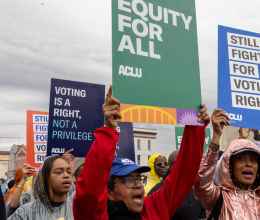
TALLAHASSEE, FL – The Senate Criminal Justice Committee today voted to pass SB 7086, a bill that undermines Amendment 4, the constitutional amendment that restores the eligibility to vote to Floridians with felony convictions after they complete all of the terms of their sentence. The amendment, which excludes those convicted of murder or sexual offenses, received votes from 5.1 million Floridians and passed in November.
The bill places unconstitutional restrictions on the eligibility to vote for individuals who should have their voting rights back, as Floridians intended. Among other deficiencies, it would effectively disenfranchise two categories of returning citizens for life: those with very small financial obligations that they will never be able to pay due to poverty and those with financial obligations for non-violent property crimes. It also seeks to alter the amendment’s self-executing language by extending far beyond what voters intended when they passed Amendment 4.
The companion House version of this bill, CRJ 3, has already passed a House subcommittee despite these constitutional concerns.
Kirk Bailey, political director, ACLU of Florida responded to today’s vote saying:
“This bill sets out to undermine the will of Florida voters by passing legislation that would severely restrict the right to vote for 1.4 million Floridians who just had their rights restored after the passage of Amendment 4. It is legislative attempts like these that ultimately affect voter disillusionment and raise suspicion in the voting process in general. Florida voters intended to pass and approve Amendment 4, and this bill is an affront to the clear intent of Florida voters who overwhelming approved Amendment 4.
“SB 7086 raises serious constitutional concerns, is overly broad, and will thwart the will of the people. It will broaden the narrow exclusions for murder and sexual felony offenses in the amendment, and expand what was contemplated by completion of one’s sentence to include civil liens and monetary obligations unrelated to one’s sentence.
“What Florida voters intended is already clear. Amendment 4 is self-executing. We urge lawmakers to uphold the will of Florida voters, stand for second chances and to withdraw this restrictive bill.”




